
23 minute read
Be ready
+IESE
Margarita Oliva Sainz de Aja
Head of Banking and Finance for Latin America, DLA Piper
Named 1 of 10 Biz/Tech Innovators in the 2020 Latina Powerhouse Top 100. First and only female Chair of the Spain-U.S. Chamber of Commerce. Co-founder and Chair of WILL (Women in Leadership in Latin America). Completed IESE’s Senior Executive Program (SEP)/Advanced Management Program (AMP) in New York in 2013.
Juan Ude : credit
Be ready
Margarita Oliva, from Granada, Spain, was always attracted to the international scene. She started out teaching international law at Granada University, where she’d earned her law degree, and from there won a Fulbright scholarship to Harvard Law School. “I was raised with an open mind, knowing that the world was a big place. Then I realized the world was an even bigger place.”
Returning to Spain after an eye-opening year abroad, she became an associate at a law firm in Madrid. Although it was an international practice, she soon realized it wouldn’t be possible to get a transfer back to the U.S. where she really wanted to be. “So I went to the U.S. anyway and started from scratch,” she says forthrightly, heeding her own advice to others when facing obstacles: “It’s a matter of making your own luck.”
Here, she reflects on her 24 years as a lawyer brokering cross-border business transactions across the Americas and how persistence is more necessary than ever in these uncertain times.
What was it like arriving in New York in the mid-’90s?
I thought it would be relatively easy: I was a qualified lawyer, I had Spanish-speaking skills, I had international and civil law experience, and I had worked in both the public and private sectors, all of which is very helpful for the kind of transactional work needed in Latin America. But I arrived just after the collapse of the Mexican economy, known as the Tequila Effect, when foreign investors were fleeing the region. Getting a job focused on Latin America was difficult. The circumstances had changed all of a sudden.
That last statement sounds familiar…
Yes, when I talk to young professionals starting out today, they’re going through something similar. Leaving aside all the financial and economic impacts of COVID-19, we’re also seeing a problem in terms of getting visas because the geopolitical environment has changed. For people wanting to pursue international careers, it’s a challenging time – but not impossible. You have to remember, just as things can suddenly change for the worse, they can also just as suddenly change for the better. Be ready. And while you wait for things to change, there are always opportunities to be found. You have to persist.
We hear a lot about the importance of resilience in facing the current crisis.
Yes, this is the time to think anew about how we do things, how we can improve, to keep refreshing ourselves, our vision and our strategies for where we’re going next, on a personal level and at the global level. The pandemic has made us stop and rethink our short-, medium- and long-term strategies. We should be doing this regularly, not just when we’re forced to, like now.
You landed on your feet and, since 1996, have advised on a variety of corporate financings, M&As and cross-border transactions in the emerging markets of Latin America. Are these markets as hot now or have they lost their shine for investors?
There has been a lot of talk about deglobalization but what I’ve experienced during all these years have been cycles – not everything at the same time everywhere. Even if all the headlines are talking about a backlash against globalization, the reality is it’s a very difficult trend to reverse. Of course the current situation is making people shift their strategies, but there’s still international investment going on at very high rates around the world and particularly in emerging economies.
Especially in my areas of energy and infrastructure, these sectors still require a huge amount of investment. That’s going to continue. And if countries want to push growth – and I’m not just talking about developing economies but even in developed ones like the United States – they will need huge investments. It’s going to happen, regardless.
What about the nature of those opportunities: Are those changing?
Most of what I’m seeing are investments in renewables: solar, wind, hydro. Even if some projects aren’t what you would traditionally consider as renewables – say, infrastructure – you will have some component dedicated to making the project environmentally friendly or sustainable. That’s the trend. Even the big carbon-based energy companies realize there is a change coming and they have been working on their own transition, converting part of their business to the renewable sector and making more investments in that direction. They can’t deny it.
Where is the drive coming from: the outside investor or demand inside the country?
Both. You could have a local developer who gets together with some local business partners to create a solar plant to sell energy to local companies or factories located there. Or it could be an international solar project developer who approaches local partners and they pitch for these opportunities.
The local contacts are key. You need your local contacts who really know what’s going on in the country. That’s something I strongly recommend to my clients: You need to get in touch with local stakeholders – business partners, accountants, lawyers, technical engineers – who really understand your business in order to make an investment successful.
I guess that’s where you come in. You recently helped broker a Deal of the Year for “truly novel legal work at a level of complexity that broke new parameters” (Latin Lawyer) for the Uruguay Central Railway, a public-private partnership (PPP) that involved a cross-border team in New York, Santiago, Lima, Mexico City and Toronto. How complicated was it to do that remotely?
When we had big, complex negotiations, we used to meet in person. But ever since the 2008 global financial crisis, companies have been less and less inclined to spend large amounts of money on travel. My business travel was already diminishing before COVID-19 and we have been closing transactions virtually for some time now. Everything is done through technology but I find things are getting much easier to do remotely, thanks to better technological tools.
Does that include artificial intelligence?
Most law firms are experimenting with AI to generate hypotheses and actionable insights. I think this can work where things are very standardized, but I don’t think AI will substitute for the role of the lawyer in analyzing and making sense of the information generated.
For example, when brokering deals, like the Uruguay one, where there are cultural differences involved, you need the technical expertise, but you also need to be reading people in a room or in a Zoom call, seeing how they react. There’s a lot of nuance involved. I remember when I started in Latin America, I thought, “We all speak Spanish, we’re all the same,” and then, in the middle of my first transaction, I realized that wasn’t true. You have to be flexible and adapt to different ways of doing things, different ways of communicating the same message. This requires a high level of cultural intelligence that I don’t think AI has yet. That may change as these tools get more and more sophisticated. Certainly, this is something everyone, in all sectors and industries, needs to be paying attention to.
Juan Ude : credit
So, working at home through the pandemic hasn’t been a problem for you?
I’ve actually been working from home for quite a long time. Twenty years ago, when I was still an associate and started a family, I was the first associate to work remotely a couple of days a week. It was innovative at the time. Some partners were very open to it, others were skeptical. But it worked, not least because I was the most interested person in making it work. Besides, working via teleconferences, with people all over the continent, has been a regular thing for me. What we’ve seen happening more recently because of the coronavirus has been a consolidation of what many of us have already been doing for a while.
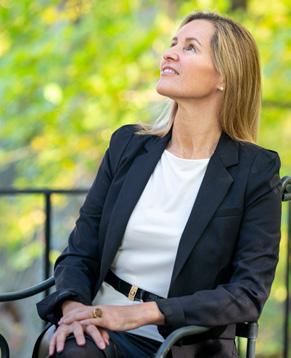
However, what I’m finding now is that it has been difficult for a lot of people, including myself, to have more constant isolation, away from coworkers and colleagues. In theory, we can keep going like this for a long time, but I do think it is having impacts on the way we work, on how much we can accomplish, on how connected we feel to our network and to our colleagues. When I talk to friends in other industries, they tell me they’re having a hard time keeping their teams motivated and together. Without a couple days per week in the office, we’re losing some of the human and group component, the glue that keeps things together.
Given the support you received, how are you helping young associates starting out?
I try to create an environment of trust through spending time with them and teaching them the reasons why we do certain things, which is helpful for their development and advancement. The goal is connecting consistently, so they have regular opportunities to bring up anything in a natural and honest way, and not just when there’s a problem.
I do this with both men and women, but mentoring young women is especially near and dear to my heart. Certain professions require the allocation of a lot of time, and you need the help of the institution during certain phases of life. I was lucky to have bosses who allowed me to make necessary changes in my career path. There are trade-offs. We cannot do everything at the same time. You have to pick what works for you at the time. The more the company helps you, the fewer negative consequences there should be on your career.
Restarting together
Teaming up to boost the world’s recovery from Covid-19.
In early 2020, IESE joined forces with 13 other organizations from around the world to launch Restarting Together. They put out a call to the world’s startup community to come up with actionable, scalable solutions that could both accelerate economic recovery and create a more resilient society in the face of the COVID-19 pandemic. More than 550 startups from 59 countries answered the call, before three winners were chosen in September.
The winners gain access to the reach and resources of the organizing partners to develop their solutions, including commercial acceleration services, technology tools, access to events, training and investment. For its part, IESE will provide mentoring, a workshop on corporate venturing (helping the entrepreneurs to optimize their collaboration with corporations) as well as the opportunity to pitch to IESE’s Business Angels Network and Finaves venture capital fund. The organizers are also free to explore the potential to develop, promote or implement any of the other proposals submitted.
The three winners demonstrate how innovation can be used to solve pressing global issues. Here they share their tips for how others can do the same.
www.restartingtogether.com
Agustin Moro
Global Director Strategic Partnerships Telefónica – Open Innovation
IESE Executive MBA 2011
MEET THE NEEDS OF VULNERABLE COMMUNITIES
Miri Berger
CEO & Co-founder 6Degrees Country: Israel Won for: Enhancing infrastructure
adaptiveness and resilience
The past year has been challenging for many people who have suddenly found themselves unemployed. But of all the people who lost their jobs, people with disabilities have been particularly affected.
Although social distancing is essential in the fight against the coronavirus, these rules are especially burdensome for those dealing with limited motion and mobility. Many disabled people will become severely isolated, as social and educational organizations that were a significant part of their daily routines are closed.
For many, these problems are compounded by difficulties in connecting to smart devices and online platforms such as Zoom, which further limit their ability to communicate with their loved ones. Loneliness and depression may follow.
The impetus for our startup was the personal experience of our co-founder, Aryeh Katz, a veteran who was injured during his military service. The difficulties he experienced in regaining his independence during his rehabilitation drove him to create a solution for people with limited movement. Our solution, MyMove, is a wearable band that enables hands-free control for people who have lost motor skills, ensuring they can still access any smart device to maintain or reclaim their independence.
As social distancing and lockdown measures continue throughout the world, being able to communicate with family and friends, staying connected to your communities and support networks, as well as shopping online, are critical activities. Our solution opens up new possibilities for employment and other opportunities that were not available beforehand, all without leaving the house.
www.6degrees.tech
Organizing partners
The winners were chosen after making a digital pitch to a jury of innovation experts from these 14 organizations (listed alphabetically)
Airbus BizLab BASF Boston Consulting Group CEMEX Citi Endeavor IDB Lab IE University IESE Mapfre Microsoft for Startups Navantia South Summit Telefónica
BE GUIDED BY COLLABORATIONS
Shawn Stein Head of Global Marketing & Strategy Neura
Country: United States Won for: Revamping the economy
through sustainable growth
Forty-eight hours: That’s all the time there is to recognize a transmission trend and break it before turning into a pandemic. Neura empowers governments and health organizations to make data-driven decisions when tackling COVID-19.
Our behavioral intelligence platform uses advanced AI and machine-learning algorithms to merge and transform vast amounts of epidemiological and behavioral data into predictive models and actionable insights. These insights are made available to decision-makers to understand and act proactively in order to get ahead of the pandemic, cut the infection chain and allow economies to reopen safely.
By targeting high-infection areas and at-risk locations, decision-makers can prioritize their scarce resources, deploy first responders or target communication where and when transmission happens. And they can do so in the most precise way, maximizing economic growth while minimizing infection risks to the population.
The global reach of Restarting Together enables us to communicate with as many people as possible. By using the power of that reach, we can make smarter decisions together and collectively avoid transmission, helping to save the lives and livelihoods of millions of people.
www.theneura.com
LEVERAGE EXISTING RESOURCES IN CREATIVE NEW WAYS
Mark Hopper Vice President, Product Management Aerial Technologies
Country: Canada Won for: Ensuring life continuity, and boosting
social inclusion and community
The aging population is a global challenge. The way we support our elders isn’t sustainable and needs to change. Current solutions tend to rely on expensive hardware, where human errors can be common, and nursing homes, which are getting crowded and in many countries became ground zero for deadly COVID-19 outbreaks.
Our solution gets around these issues by providing a sensing technology that is affordable and effortless, and which empowers seniors, and their caregivers, in independent living situations by enabling safe, remote care. Using AI models and motion intelligence, Aerial can infer motion activities and time-critical events. Our technology uses an existing Wi-Fi connection to detect disruptive motions in the home, which can be applied not only to remote care but to home automation and security as well. In coming up with our solution, we thought creatively about how to reuse existing technologies and resources. Millions of households already have Wi-Fi, so we figured we could use that existing infrastructure without adding any additional hardware. Doing it that way makes our solution more affordable, at only a few dollars a month; more robust, as we evolve with each future Wi-Fi upgrade; and more adaptive, as the AI in our product can work in any type of home and according to each person’s behavioral patterns and needs.
Restarting Together represents what Aerial is all about: leveraging innovative technology to make people’s lives better while working together with others to ensure the best possible solutions to current and future problems. It has been inspiring to see so many entrepreneurs looking to be part of a global solution.
www.aerial.ai
Sowing sustainability
While COVID-19 has raged out of control throughout much of the United States and Europe, its impact on health in Africa has not been as devastating as some health experts feared. Scientists speculate that this could have something to do with the extensive community, health and public awareness ecosystems built up over many years of dealing with other disease outbreaks.
“One of the biggest lessons I’ve taken away from 2020 is the need to build ecosystems that link and shorten supply chains for input and output markets,” says Aggie Konde, Vice President of Program Development & Innovation at the Alliance for a Green Revolution in Africa (AGRA), an organization that is all about building sustainable agricultural systems to increase incomes and boost food security for smallholder farmers.
COVID-19 has forced us all to “take a deeper look and prioritize some of the issues that we always knew we needed to address,” she says. For AGRA, that was realizing the urgency of building partnerships and programs to improve the efficiency, safety and competitiveness of domestic agri-food systems. “In sub-Saharan Africa, there is a tendency for businesses to want to do everything themselves. So, a manufacturer will also try to handle logistics, retail, financing, and so on. This strains businesses, saps resources, reduces margins and is unsustainable.”
While there are various actors who can execute the various tasks in the chain efficiently, the problem is they are not visible to each other nor interlinked, leading to logistical difficulties – for example, when smallholder farmers try to engage in cross-border trade.
That’s where AGRA comes in: “By supporting efforts that link all these actors in the supply chain, we can improve competitiveness, reduce the costs of doing business and link demand to supply, allowing inclusive businesses to thrive. I think this can bring more farmers into the cash economy.”
Konde cites an input finance model implemented in Ghana, Burkina Faso and Mali: “It involved six banks and 43 SMEs, where 40% of the risk was taken by value-chain actors and 60% by the banks. This model unlocked loans worth US$1.7 million for 19,000 farmers.”
Inclusive transformation depends on building ecosystems across supply chains to catalyze change
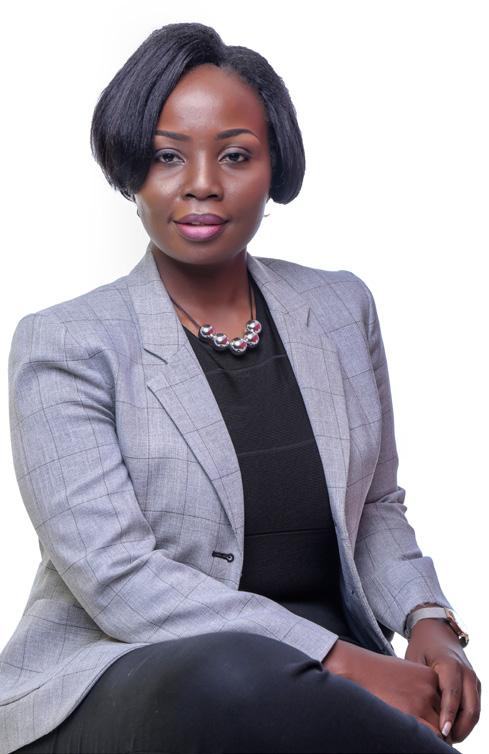
Aggie Asiimwe Konde
Vice President Program Development & Innovation Alliance for a Green Revolution in Africa (AGRA)

Leadership pillars
Before joining AGRA in Kenya, Konde worked as a marketer in the private sector in her home country of Uganda, which taught her about “building opportunities in areas where there was little market exploitation.”
Then, she worked in media, which was part private, part public-facing: “It was in this role that I began to appreciate the need for inclusive growth in development, which starts with providing those who are excluded with a platform where they can speak up. I started to think hard about how to build inclusive economies that leave no people behind and that support farmers in being food secure.”
It also made her reflect on the nature of leadership: “A good leader is one dedicated to improving people’s livelihoods. In Africa, as elsewhere, we want our leaders to be accountable, and that requires a citizenry that is involved and proactive. The private sector must demand that their public leaders create the environment necessary for people to thrive.
Leadership is about creating functioning systems, because if you only build one pillar, it’s just a matter of time before the whole thing collapses.
Leaders must take a holistic approach to make sure the entire ecosystem is sustainable.”
Konde gives the example of the financial sector, which views agriculture as high risk – and rightly so, as the risks in financing agricultural companies measured by default rates are twice as high as in other sectors. Investment opportunities in the production of crops are limited, owing to the sector’s reliance on rain and its vulnerabilities to external events such as climate change.
However, crop production is just one segment of the value chain – albeit a vital one, given that an agricultural company cannot grow if its crops do not grow. But the value
chain encompasses many other investment opportunities, including climate smart technologies, logistics, input provision and processing. That is why there is such a need for inclusive finance that looks at all these elements collectively and is willing to share the risks more broadly. This is AGRA’s role: to show these interdependencies, bring companies together and formulate solutions.
From surviving to thriving
Of course, before you can have commercial farming ambitions, you first need to increase household productivity and answer to the basic need of self-sufficient food all year round. “We aim to support smallholder farmers to rise above subsistence farming, producing surpluses that can be sold to generate extra income that is used to improve their livelihoods, educate their children and move above the poverty line.”
While participating in IESE’s Global CEO Program for Africa in 2019, Konde was able to “learn, network, share experiences and unlock some of Africa’s greatest opportunities. Together with my classmates from East and West Africa, we examined problems, discovered opportunities and designed scalable, wholly African solutions.”
AGRA’s vision is bold: to transform the lives of 30 million smallholder farmers from a solitary struggle to thriving businesses. It is a vision based on the conviction that, by joining forces (both public and private), African-based solutions can empower Africa’s farmers to feed the continent and the world sustainably.
“We take a tailored approach,” Konde explains of AGRA’s work in 11 countries. “We don’t tell countries what to do. We support local government priorities because we want to create self-sustaining systems. The way we increase productivity will differ from country to country. In one, it may be supporting efforts to access quality seeds. In another, the focus may be on the last-mile delivery. Or it may be inclusive financing solutions for those at the bottom of the
pyramid. Or a combination of multiple solutions, including policy support and partnerships.”
“The important thing,” she continues, “is that the systems are functioning, and that farmers have access to best practices, financial services, enabling policies and markets. The countries set the priorities, and we work with them to make it happen – providing technical assistance, investing in thousands of SMEs to overcome market barriers, and linking the public sector and research institutions with private sector actors who can catalyze change.”
As someone who often finds herself as the lone woman at the table, Konde is keen to mentor other women, helping them to break through their own glass ceilings. “I try to take on around 15 girls a year, introducing them to people and giving them opportunities to see the world from a different perspective. I’d like to build a digital solution that could reach many more young women – and young men, too. I want to empower the next generation to become the leaders that Africa needs.”
Her parting words for attaining sustainable, inclusive transformation in Africa are just as applicable to business leaders the world over: “We need to stop running a marathon and start passing the baton in a relay.”
LIMITLESS LEARNING
The pandemic has changed the way we do business but also the way we learn. Today’s managers need to keep developing and growing, especially in this new environment.
Marc Sosna Executive Director IESE Learning Innovation Unit
“The illiterate of the 21st century will not be those who cannot read and write, but those who cannot learn, unlearn and relearn.” This quote (by psychologist Herbert Gerjuoy, later popularized by the futurist Alvin Toffler) rings truer than ever today. Strategies that worked in the past, or even those that may be working today, are not enough anymore. That’s why we need learning agility, characterized by:
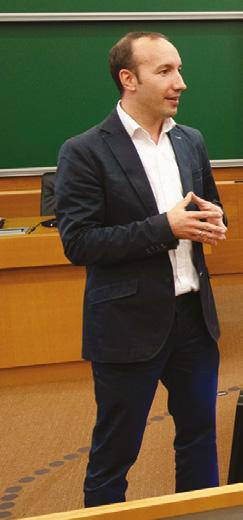
• Mental agility: being receptive to other perspectives and comfortable with complexity and change. • People agility: being a good communicator and working well with diverse people and stakeholders. • Result agility: being able to deliver results in firsttime situations or crises. • Change agility: being at the forefront of change and willing to experiment. • Self-awareness: knowing your strengths and weaknesses, and how you learn best.
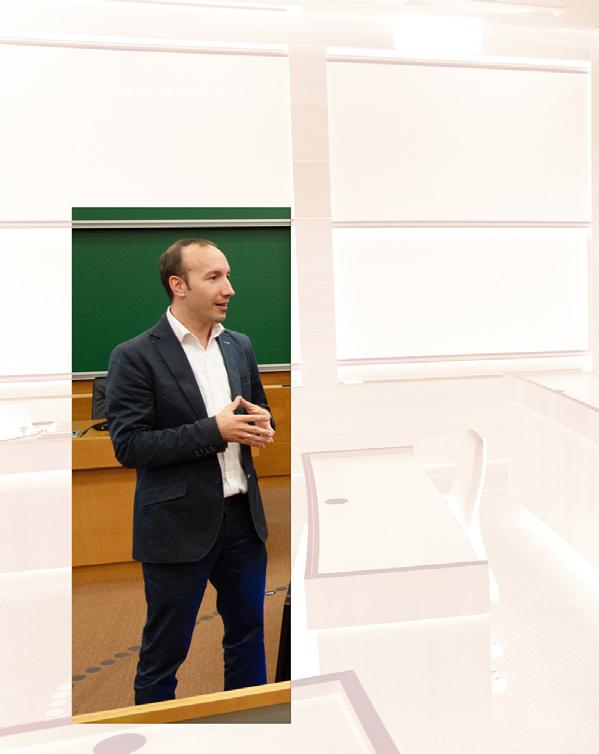
The common thread here is being open to diversity, new experiences and different mental models. Closely related to the above are two other important mindsets:
• Antifragility: seeing shocks positively, in that the more you’re exposed to, the more resilient you become. • Co-creation: connecting the dots and uniting people, teams and companies to generate new knowledge and innovative value propositions together, and shaping an activity system that will deliver value to customers and other stakeholders.
These are the hallmarks of future success. General managers, especially, will benefit from developing this kind of literacy. It’s not about what you know, but knowing what’s needed at all times and then quickly upgrading your skills to meet the occasion.
Emily Beatty Background in oil and gas maintenance and operations, looking to switch to consulting
A crisis is a good moment for self-development, to prepare yourself professionally for when better times return. In doing so, you will find yourself in good company, among those who likewise decided to take a risk in uncertain times. I had hit a glass ceiling in my career and decided to change paths; however, that is hard to do without knowledge, experience or contacts in different sectors. This is what I have found in my MBA through teachings and my new network. Granted, the new online tools make some interactions more challenging, but I believe it is good preparation for the increasingly digital world of work that we will be going back to. Developing appropriate skills, work habits and connections via digital tools are key capabilities for future leaders.
David Trasobares HR Executive Development CaixaBank
The current volatility requires us all to adapt and manage in more dynamic ways. And while the economic situation is forcing us to ask some tough questions, it is also forcing us to be more flexible in how we seek the answers. In this regard, online methods are proving their worth, although getting the most out of them demands that we develop new talents. I see this as a key area for managers: learning not just how to communicate via digital media but also how to build effective working relationships. As we anticipate longer periods of remote working, being able to manage, influence and motivate teams using digital tools becomes of paramount importance, deserving our special attention.
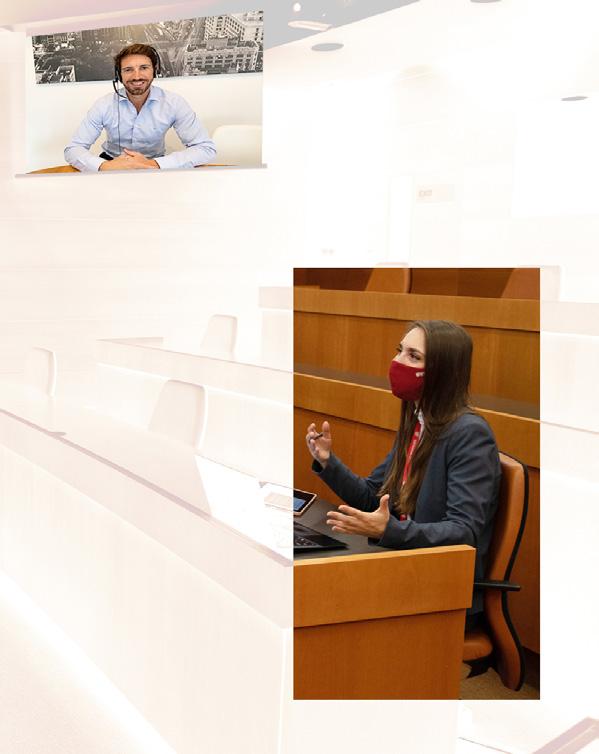
Flexible PDD
Recognizing the need for learning agility, IESE has launched a new flexible format of its flagship Spanish-language executive education program, adapted for today’s realities.
Aimed at: functional managers with at least 10 years’ work experience, looking to take their skills to the next level.
Format: in-person, blended and online sessions, with guided self-study, over 8 months.
: Edu Ferrer credit



